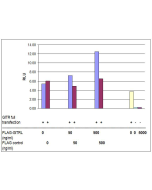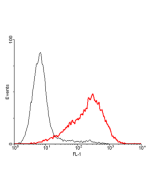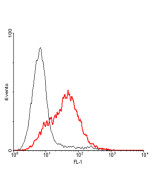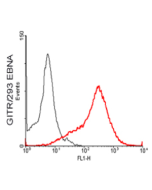Cookie Policy: This site uses cookies to improve your experience. You can find out more about our use of cookies in our Privacy Policy. By continuing to browse this site you agree to our use of cookies.
AdipoGen Life Sciences
anti-GITRL (human), pAb

This antibody has been tested in immunohistochemistry, analyzed by an anatomic pathologist and validated for use in IHC applications against formalin-fixed, paraffin-embedded human tissues. The image shows the localization of the antibody as the precipitated red signal, with a hematoxylin purple nuclear counterstain.
1: Human GITRL (His-tagged).
2: Human GITRL (FLAG®-tagged).
3: Mouse GITRL (FLAG®-tagged).
| Product Details | |
|---|---|
| Synonyms | Glucocorticoid-induced TNF Receptor Ligand; AITRL; Activation-inducible TNF-related Ligand; TNFSF18 |
| Product Type | Polyclonal Antibody |
| Properties | |
| Source/Host | Rabbit |
| Immunogen/Antigen | Recombinant human GITRL. |
| Application |
ELISA: (direct and indirect: 1:5’000-1:10’000) |
| Crossreactivity | Human |
| Specificity |
Recognizes human GITRL. Detects a band of ~15-17kDa by Western blot. Does not cross-react with mouse GITRL. |
| Purity Detail | Protein A-affinity purified. |
| Concentration | 1mg/ml |
| Formulation | Liquid. 0.2μm-filtered solution in PBS, pH 7.4. Contains no preservatives. |
| Isotype Negative Control | |
| Shipping and Handling | |
| Shipping | BLUE ICE |
| Short Term Storage | +4°C |
| Long Term Storage | -20°C |
| Handling Advice |
After opening, prepare aliquots and store at -20°C. Avoid freeze/thaw cycles. |
| Use/Stability | Stable for at least 6 months after receipt when stored at -20°C. |
| Documents | |
| MSDS |
 Download PDF Download PDF |
| Product Specification Sheet | |
| Datasheet |
 Download PDF Download PDF |
GITRL is expressed on dendritic cells (DC), monocytes, macrophages, B cells, activated T cells, endothelial cells, osteoclasts and various healthy non-lymphoid tissues (e.g., testis, ...). GITRL is constitutively expressed and released as soluble form by solid tumors and various hematopoietic malignancies. GITRL causes differentiation of osteoclasts, activation of macrophages, but also alteration of carcinoma and leukemia cells and influences apoptosis. Binding to GITR is important in regulating T-cell proliferation and TCR-mediated apoptosis. GITRL is implicated in development of autoimmune diseases and in the immune response against infectious pathogens and tumors.










